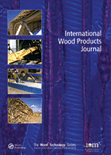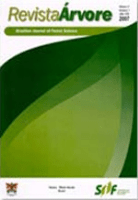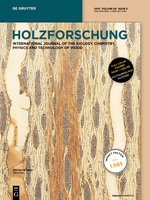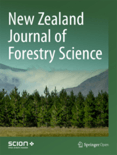
Acta Facultatis Xylologiae Zvolen
Scope & Guideline
Unveiling contemporary trends in forestry research.
Introduction
Aims and Scopes
- Wood Properties and Mechanics:
Research focusing on the physical and mechanical properties of various wood species and wood-based products, including studies on density, stiffness, and durability. - Sustainable Wood Processing:
Investigation into environmentally friendly practices and technologies in wood processing, emphasizing the importance of sustainability and circular economy principles. - Wood-Based Composites and Materials:
Development and analysis of wood-based composites, including particleboards, MDF, and engineered wood products, highlighting their mechanical and thermal properties. - Fire Safety and Treatment:
Studies on the fire resistance of wood products and the effects of various treatments on enhancing their safety and performance in fire scenarios. - Innovative Wood Technologies:
Exploration of new technologies in wood processing, including CNC machining and laser engraving, aimed at improving efficiency and product quality. - Microclimate and Environmental Impact:
Research into the influence of microclimatic conditions on wood properties and the environmental impact of wood processing activities. - Family Business Dynamics in Wood Sector:
Analysis of family-owned businesses in the wood processing industry, focusing on their challenges, motivations, and contributions to the sector.
Trending and Emerging
- Recycling and Waste Utilization:
There is a growing emphasis on the use of recycled materials in wood-based products, highlighting the journal's commitment to sustainability and innovation in waste management. - Impact of Climate Change on Wood Properties:
Research exploring how climate change affects wood characteristics and processing techniques is increasingly relevant, aligning with global environmental concerns. - Advanced Simulation Techniques:
The use of numerical simulations to study moisture dynamics, fire behavior, and processing conditions is on the rise, indicating a trend towards more sophisticated modeling approaches. - Health and Safety in Wood Processing:
Topics addressing the health impacts of wood dust and chemical emissions during processing are gaining importance, reflecting an increased awareness of occupational safety. - Nanotechnology in Wood Engineering:
The application of nanotechnology to improve wood properties and reduce environmental impact is emerging as a significant focus area, showcasing innovation in material science.
Declining or Waning
- Traditional Wood Treatment Methods:
Research focusing on conventional methods of wood treatment has decreased, possibly due to a shift towards more innovative and sustainable practices that prioritize efficiency and environmental impact. - Basic Wood Anatomy and Classification:
Papers centered on fundamental studies of wood anatomy and classification have become less frequent, indicating a potential shift towards applied research and technology-driven studies. - General Economic Analyses of Wood Industry:
Broad economic analyses regarding the wood industry are less prevalent, suggesting that researchers may be focusing more on specific case studies or comparative analyses that yield practical insights. - In-depth Historical Studies of Wood Usage:
The publication of historical analyses of wood usage and processing practices has diminished, possibly overshadowed by contemporary research that addresses current challenges and innovations.
Similar Journals

Drvna Industrija
Empowering Research for Sustainable Forest ManagementDrvna Industrija, a peer-reviewed journal published by the Zagreb University, Faculty of Forestry, serves as a cornerstone for research in the field of forestry and wood industry sciences. Established in 1980 and with a commitment to open access since 2006, this journal allows for a broad and unrestricted dissemination of knowledge, featuring original articles, reviews, and case studies that reflect the latest advancements in forestry practices and wood industry technologies. With its ISSN 0012-6772 and E-ISSN 1847-1153, Drvna Industrija is indexed in Scopus, holding a respectable Q3 quartile ranking in the forestry category, which places it in the top half of the field. As of 2023, it ranks 85th out of 174 in Agricultural and Biological Sciences with a 51st percentile, highlighting its relevance and impact in contemporary research. The journal's dedication to promoting innovative practices and fostering academic excellence continues to engage researchers, professionals, and students in Croatia and around the world, contributing significantly to the discourse on sustainable forest management and utilization of wood products.

International Wood Products Journal
Championing Innovative Developments in Wood ProductsInternational Wood Products Journal is a premier academic publication dedicated to advancing knowledge in the fields of forestry and materials science. Published by SAGE Publications Inc, this journal serves as a critical forum for researchers and professionals alike, focusing on innovative developments and sustainable practices related to wood and wood products. With an impressive impact factor that places it in the Q2 category for forestry and Q3 for materials science in 2023, it showcases high-quality research that influences policy and practice. Covering a wide scope from 2010 to 2024, the journal offers insightful articles and reviews that highlight the latest findings and technological advancements in wood products. Notably indexed in Scopus, it ranks 69th out of 174 in Forestry and 296th out of 463 in General Materials Science, attesting to its relevance and contribution to these fields. Researchers and students are encouraged to explore this journal for cutting-edge information and collaborative opportunities within the international wood products community.

REVISTA ARVORE
Rooted in Research, Growing Global ImpactREVISTA ARVORE is a distinguished, peer-reviewed journal in the field of Forestry, published by Universidade Federal de Viçosa in Brazil. Renowned for its commitment to open access since 2002, this journal facilitates the dissemination of innovative research and knowledge to a global audience, encompassing topics from sustainable forest management to ecological conservation. With an impact factor reflective of its engagement in the community and a current Scopus ranking that places it in the 28th percentile among journals in Agricultural and Biological Sciences, it provides a vital platform for both emerging and established scholars. The journal is indexed under ISSN 0100-6762 and E-ISSN 1806-9088, making it accessible to a wide readership. As it converges its publication years from 2006 to 2024, REVISTA ARVORE aims to contribute significantly to the advancement of forestry science and practices, thereby encouraging environmental sustainability and innovation within the field.

Maderas-Ciencia y Tecnologia
Bridging disciplines for a sustainable future.Maderas-Ciencia y Tecnologia, published by UNIV BIO-BIO in Chile, is a prestigious open-access journal dedicated to advancing knowledge in the fields of Forestry, Chemical Engineering, and Materials Science. With an ISSN of 0717-3644 and an E-ISSN of 0718-221X, this journal has been serving the academic community since 2005, providing a platform for research that spans multiple disciplines including Industrial and Manufacturing Engineering. Recognized for its scholarly contributions, Maderas-Ciencia y Tecnologia achieves a commendable Q2 ranking in Forestry and several Q3 rankings in associated fields such as Chemical Engineering and Materials Science as of 2023. The journal aims to foster innovation and collaboration by publishing high-quality research articles that address pressing issues in wood engineering and technology, appealing to researchers, professionals, and students alike. With a strong commitment to open access, all content is readily available to a global audience, ensuring the widespread dissemination of knowledge and fostering advancements within these critical areas.

CANADIAN JOURNAL OF FOREST RESEARCH
Advancing knowledge in forestry and ecological sciences.Canadian Journal of Forest Research (ISSN: 0045-5067, E-ISSN: 1208-6037), published by Canadian Science Publishing, stands as a leading platform for disseminating cutting-edge research in the field of forestry and ecological sciences. With an impressive impact factor and a steady reputation for high-quality publications, this journal occupies a prestigious position indicated by its Q1 ranking in Forestry and Q2 in Ecology as of 2023, alongside commendable placements in global and planetary change studies. Covering a broad scope from sustainable forest management to the impacts of climate change on forest ecosystems, the journal encourages submissions that address contemporary challenges and innovations in forest research. Operating from its base in Ottawa, Canada, the Canadian Journal of Forest Research has been a cornerstone of academic discourse since 1974, offering researchers and professionals vital access to pioneering studies that inform policy and practice in forestry. Researchers, educators, and students alike will find this journal an indispensable resource for advancing knowledge and fostering collaboration in the vital realm of forest research.

IAWA JOURNAL
Innovating Insights for a Greener TomorrowIAWA JOURNAL is a distinguished academic publication dedicated to the fields of forestry and plant science, published by BRILL, a reputable name in scholarly publishing. With an ISSN of 0928-1541 and an E-ISSN of 2294-1932, the journal has garnered impressive rankings within Scopus, placing 48th in Forestry and 182nd in Plant Science, indicating its strong influence and relevance in these scientific areas. Operating from the Netherlands, the IAWA JOURNAL focuses on a broad scope of research themes, contributing to the advancement of knowledge from its inception in 1980 and continuing robustly through to 2024. With a Category Quartile of Q2 in Forestry and Q3 in Plant Science as of 2023, the journal serves as a vital resource for researchers, professionals, and students alike, facilitating the exchange of innovative ideas and significant findings in the plant biology community. Although the journal does not currently offer open access, it remains a pivotal platform for disseminating high-quality research that shapes the future of the ecological and environmental sciences.

HOLZFORSCHUNG
Bridging theory and practice in wood applications.HOLZFORSCHUNG is a distinguished journal in the field of biomaterials, published by WALTER DE GRUYTER GMBH and based in Berlin, Germany. With an ISSN of 0018-3830 and an E-ISSN of 1437-434X, this journal has been a key player in advancing the understanding of wood research and its applications since its inception in 1947. As of 2023, it holds a Q3 ranking in the biomaterials category, positioned at #77 out of 137 in Scopus, reflecting its growing reputation within the academic community. Although it does not currently offer open access, HOLZFORSCHUNG aims to bridge the gap between theoretical research and practical applications, providing valuable insights for researchers, professionals, and students alike. With a focus on innovative studies and contributions to the understanding of wood as a biomaterial, it remains integral to the discourse in materials science.

BioResources
Pioneering research for a greener tomorrow with biomaterials.BioResources is a pioneering open access journal launched in 2006, dedicated to disseminating knowledge at the intersection of bioengineering, environmental engineering, and waste management. Published by NORTH CAROLINA STATE UNIVERSITY DEPARTMENT OF WOOD & PAPER SCIENCE, this journal serves as a vital platform for researchers and professionals to explore the sustainable use of biomaterials and renewable resources. With an impact reflected through its Scopus rankings, including a respectable position in the 2023 quartile rankings across several relevant categories, BioResources is committed to advancing scientific discourse and enhancing the understanding of bioresource utilization. The journal not only supports high-quality research but also encourages contributions that shape environmental policies and practices. Accessible globally, it invites active participation from scholars aiming to contribute to a more sustainable future. Researchers, professionals, and students alike will find valuable insights and groundbreaking research within its pages as it continues to foster knowledge and innovation in the field.

JOURNAL OF TROPICAL FOREST SCIENCE
Innovating Conservation Strategies for Tropical EcosystemsThe JOURNAL OF TROPICAL FOREST SCIENCE, published by the FOREST RESEARCH INST MALAYSIA, serves as a vital platform for disseminating research focused on tropical forestry. Since its inception in 1988 and transitioning to its current form in 1993, this journal has established itself within the academic community, currently holding a commendable Q3 ranking in the Forestry category, as per the 2023 metrics. With an ISSN of 0128-1283 and E-ISSN 2521-9847, it provides crucial insights into the ecological, economic, and social aspects of tropical forest management and conservation, making it an indispensable resource for researchers, practitioners, and students alike. Although it does not operate under an open-access model, the journal emphasizes quality and relevance in its publications, contributing significantly to the ongoing discourse in agricultural and biological sciences with a Scopus rank of #89 out of 174 and a 49th percentile position.

NEW ZEALAND JOURNAL OF FORESTRY SCIENCE
Advancing Sustainable Forestry PracticesNEW ZEALAND JOURNAL OF FORESTRY SCIENCE (ISSN: 0048-0134; E-ISSN: 1179-5395), published by SCION, stands as a pivotal resource for researchers, professionals, and students dedicated to the fields of forestry, ecology, and plant sciences. With a strong commitment to open access since 2013, the journal promotes the dissemination of high-quality research and innovative practices within these disciplines, thereby fostering a greater understanding of the natural environment. The journal has achieved commendable rankings, being placed in the Q2 category in Ecology, Forestry, and Plant Science, reflecting its significant contribution to advancing knowledge and best practices in these areas. Based in Switzerland and published by SCION, a trusted name in forest research, the journal plays an integral role in shaping the dialogue around sustainable forest management and ecological conservation. As such, it serves as an essential platform for scholarly discourse and a valuable resource for anyone engaged in forestry and environmental studies.